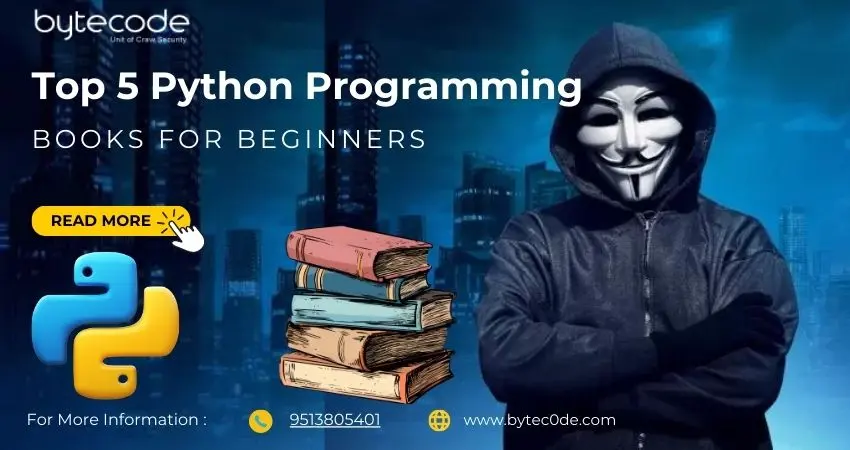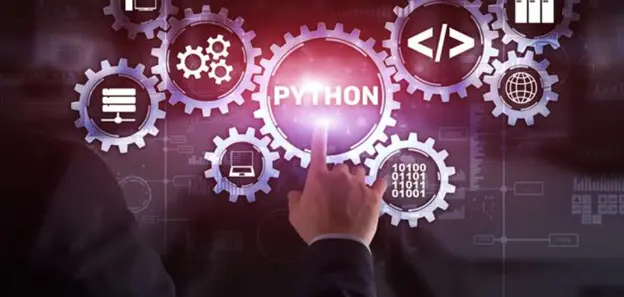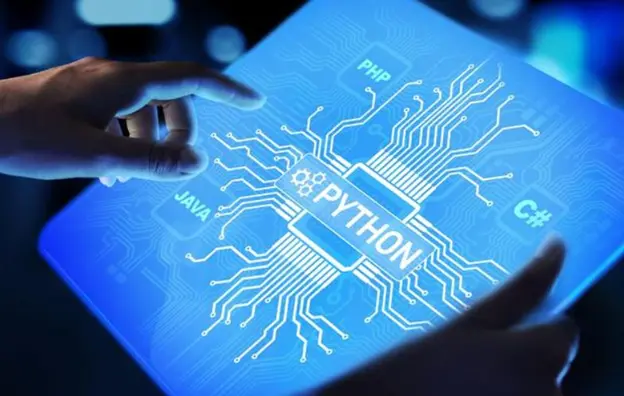Introduction:
Python, renowned for its adaptability and simplicity, has emerged as the programming language of choice for novices. It is crucial to have the appropriate resources in order to commence. In this article, we explore the five best Python programming books for beginners, each of which provides distinctive perspectives and educational opportunities.
What is Introduction of Python?
Python is an interpreter-based, high-level Python programming language renowned for its adaptability and simplicity of learning. In 1991, it was initially introduced by Guido van Rossum. Python’s design philosophy prioritizes code readability through the visual structuring of code through the use of substantial whitespace.
What are the 4 Types of Data in Python?
Data types are value categories in Python; each value is associated with a distinct data type. Python comprises four fundamental data types by default: strings, booleans, integers, and floating-point numbers. Each of the following data types fulfills a unique function when utilizing Python programming:
- Integers (`int`):
- These are whole numbers without a fractional part. They can be positive, negative, or zero.
- Example: `5`, `-3`, `42`
2. Floating-Point Numbers (`float`):
- These represent real numbers and include a fractional part, even if that fractional part is zero.
- They are often used in Python for more precise calculations and for representing numbers that cannot be accurately depicted as integers.
- Example: `14`, `-0.001`,` 2.0`
3. Strings (`str`):
- Strings are sequences of characters used to store text data.
- In Python, strings are created by enclosing characters in quotes (either single, double, or triple quotes for multi-line strings).
- Example: `‘Hello, World!’`, `“Python Programming”`
4. Booleans (`bool`):
- This data type represents one of two values: `True` or `False`.
- Booleans are often used in conditions and loops to control the flow of a Python program.
- They are the result of comparisons or logical operations in Python.
Career Scope in Python
Python, presently one of the most widely used programming languages, provides a plethora of career prospects owing to its extensive application across numerous rapidly expanding industries. An examination of the varied professional trajectories and extent of Python:
| Web Development | Python programmers have the ability to specialize in the development of server-side web applications. The widespread use of Python frameworks such as Django and Flask in web development is attributable to their scalability and efficiency. |
| Data Science and Analysis | Python is the language of choice for data scientists. Its libraries, including SciPy, NumPy, and Pandas, simplify data manipulation and analysis. Python is additionally employed to visualize complex data via libraries such as Matplotlib and Seaborn. |
| Machine Learning and Artificial Intelligence | The robust library support and simplicity of Python have contributed to its widespread adoption within the AI and machine learning community. TensorFlow, Keras, and Scikit-learn are examples of libraries that offer the essential tools required to construct advanced machine-learning models. |
| Automation and Scripting | Python is an outstanding programming language for scripting and automating repetitive activities. It is capable of automating a wide range of processes, including system administration, web crawling, and file manipulation. |
| Cybersecurity | In cybersecurity, robust libraries and tools of Python are utilized to develop security-related tools, analyze vulnerabilities, and construct secure systems. |
| Game Development | While Python may not be as widely used in the gaming industry as C++ or C#, it is still employed for scripting and the creation of small-scale games. Pygame is a Python library utilized for game development. |
| Scientific and Numeric Computing | Python is extensively employed in the realm of scientific and mathematical computations, facilitated by libraries such as NumPy and SciPy. |
| Software Development | Python is a preferred programming language for developing desktop applications, command-line utilities, and business applications due to its readability and efficiency. |
| Education and Training | Python is frequently introduced as an initial programming language in academic settings due to its straightforward syntax. This generates opportunities for Python-specialized instructors and trainers. |
| Freelancing | Python programmers may also pursue independent initiatives involving data analysis, web development, and other fields. |
Top 5 Python Programming Books for Beginners
- “Python Crash Course” by Eric Matthes
| Overview | The projects in this book serve as a practical introduction to Python. It is ideal for individuals who favor experiential learning. |
| Key Features | ● From fundamentals to practical endeavors.
● Exercises and exams are incorporated to assess comprehension. ● Concentrates on practical implementations, such as developing games or uncomplicated web applications. |
2. “Automate the Boring Stuff with Python” by Al Sweigart
| Overview | The book by Al Sweigart is optimal for Python novices who wish to apply the language to commonplace tasks immediately. |
| Key Features | ● Python is demonstrated via practical instances.
● Automation of mundane duties is emphasized. ● Applicable to novice programmers with no prior experience. |
3. “Python for Kids: A Playful Introduction to Programming” by Jason R. Briggs
| Overview | This engaging and entertaining introduction to Python is designed for younger readers but is suitable for those of any age. |
| Key Features | ● A playful method of instructing Python fundamentals.
● Comprises entertaining endeavors such as simple animations and games. ● Simplified language appropriate for children and complete beginners. |
4. “Head First Python” by Paul Barry
| Overview | An exceptionally illustrated book that utilizes an innovative approach to facilitate rapid and effective Python learning. |
| Key Features | ● Employs a visually captivating structure.
● Emphasizes accelerating the process of consumers producing functional code. ● An assortment of challenges and exercises are included. |
5. “Learn Python the Hard Way” by Zed A. Shaw
| Overview | Teaching Python in a rigorous manner, with an emphasis on repetition and practice. |
| Key Features | ● Promotes knowledge acquisition via extensive practice.
● Deeply covers the fundamentals. ● Ideally suited for students who excel in meticulousness and repetition. |
Best Way To Learn Python Step By Step
Python can be a fascinating and beneficial subject to study, particularly when approached methodically. The following is a step-by-step guide for efficiently learning Python:
- Understand the Basics:
- Start with the Fundamentals,
- Practice Simple Programs,
- Explore Python’s Core Concepts:
- Functions and Modules,
- Data Structures,
- Work on Small Projects:
- Apply Your Knowledge,
- Learn Object-Oriented Programming (OOP):
- Understand OOP Concepts,
- Dive Into Intermediate Topics:
- Exception Handling,
- File I/O,
- Explore Python Libraries and Frameworks:
- Standard Library,
- External Libraries,
- Understand Advanced Python Concepts:
- Decorators and Generators,
- Asynchronous Programming,
- Work on Real-world Projects:
- Build Larger Projects, etc.
Best Place To Learn Python
Your learning manner, budget, and desired level of intricacy are all factors in determining the ideal location to study Python. An abundance of resources is at one’s disposal, spanning from interactive platforms and literature to online tutorials and courses. The following are some of the most productive resources for learning Python:
- Online Courses:
- Super Learning
- Interactive Learning Platforms for python:
- Craw Security,
- Bytecode Security,
- Crawsec Institute, etc.
- YouTube Channels:
- Corey Schafer,
- Sentdex,
- Tech With Tim,
- Online Communities and Forums:
- Stack Overflow,
- Reddit (r/learnpython),
- GitHub,
Who Needs To Learn Python?
Here’s a breakdown of who can benefit from learning Python:
- Aspiring Programmers and Computer Science Students,
- Data Scientists and Analysts,
- AI and Machine Learning Engineers,
- Web Developers,
- Software Developers,
- Academicians and Researchers,
- Network Engineers and System Administrators,
- Finance Professionals,
- Bioinformatics and Medical Professionals,
- Creatives and Designers,
- Students of Diverse Fields,
- Hobbyists and DIY Enthusiasts, etc.
Conclusion
All in all, Python is an indispensable talent for professionals and enthusiasts in a vast array of disciplines due to its extensive applicability. Its capability to optimize operations, conduct data analysis, and develop diverse applications renders it a potent instrument for individuals with an interest in technology.
In the bottom line, you can join Bytecode Security, the Best Python Training Institute in India to learn all the fundamentals of Python Programming Language right from scratch under the proactive guidance of world-class training professionals having many years of crucial experience.



